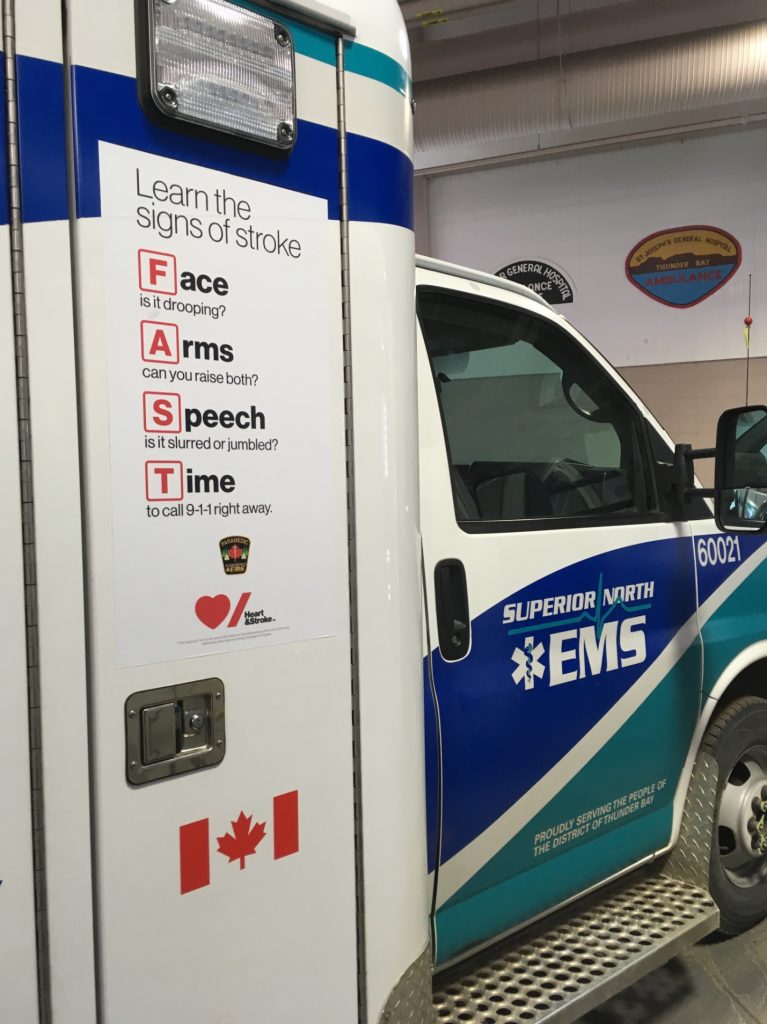Heart & Stroke and Northwestern Ontario take FAST action to save lives
by Communications & Engagement
 The FAST decal (such as this example on a Superior North EMS ambulance) will be displayed on ambulances across the region. The decals encourage individuals to seek emergency care right away if they encounter stroke symptoms.
The FAST decal (such as this example on a Superior North EMS ambulance) will be displayed on ambulances across the region. The decals encourage individuals to seek emergency care right away if they encounter stroke symptoms.Heart & Stroke, the Paramedic Services from the Northwestern Ontario (NWO), and Thunder Bay Regional Health Sciences Centre are teaming up to ensure that more lives are saved from the effects of stroke.
Paramedic Services will be helping to raise awareness of the signs of stroke and the importance of acting quickly by placing decals with the signs of stroke acronym ‘FAST’ on all of their ambulances. The decals encourage individuals to seek emergency care right away if they encounter stroke symptoms.
FAST stands for: Face: is it drooping? Arms: can you raise both? Speech: is it slurred or jumbled? Time: to call 9-1-1 right away.
Stroke is a medical emergency. The ability to recognize the FAST signs of stroke and act fast by calling 9-1-1 or your local emergency number can mean the difference between life and death, or the difference between a full recovery and lasting disability.
“We wanted to participate in this program as we see it as a great initiative,” said Dan McCormick, chief of Rainy River District Emergency Medical Services. “It had actually been shown to us by a paramedic who took a picture of a Winnipeg ambulance with the decals. In NWO, 47 per cent of people do not call 911 when experiences the signs of stroke. This is one way we can partner to raise public awareness in our region.”
“I know that I am most fortunate and that stroke does not always have a happy ending,” said Nancy Black, a stroke survivor who had a stroke four years ago. “It is vital to continue efforts to educate. Not only for the individual having a stroke, but for those who are witnesses to recognize the signs and the importance of taking immediate action. Timing is everything and putting FAST on the ambulances is particularly important in this vast geography where distance is measured in time not kilometers.”
Stroke is the number three killer of Canadians, and is the leading cause of disability. There are an estimated 62,000 strokes in Canada each year, which is one every nine minutes. More than 80 per cent of individuals who have a stroke and make it to the hospital will survive, with varying degrees of recovery.
“Raising awareness of the signs of stroke along with the urgent need to call 9-1-1 or your emergency number will reduce the impact of stroke in NWO,” said Meaghan Sharp, Director, Cardiovascular, Stroke and Medicine Programs at Thunder Bay Regional Health Sciences Centre. Northwestern Ontario Regional Stroke Network has been actively working on the FAST campaign by partnering with our four EMS services and the Heart and Stroke Foundation to build awareness and help save lives. Look for the acronym F.A.S.T. on all ambulances in the Northwester Ontario region”
Heart & Stroke Director of Ontario Mission, Karen Trainoff, is delighted to expand the reach of the FAST campaign through this partnership with Superior North Emergency Medical Services, Rainy River District Emergency Medical Services, Northwest Emergency Medical Services, Naotkamegwanning EMS from NWO and Thunder Bay Regional Health Sciences Centre – Northwestern Ontario Regional Stroke Network. “We know that public awareness increases in communities that have FAST decals on their vehicles. We are pleased to know that people will be reminded of the FAST signs of stroke every time they see a Northwestern Ontario ambulance,” said Ms.Trainoff. “Our objective is to ensure that all Canadians, no matter where they live or how old they are, know and remember the FAST signs of stroke.”
Stroke facts
- A stroke is a sudden loss of brain function.
- 62,000 strokes occur in Canada each year – that is one stroke every nine minutes.
- 83 per cent of those who have a stroke and make it to hospital will now survive.
- Brain cells die at a rate of 1.9 million per minute during stroke.
- Each year, more than 13,000 Canadians die from stroke.
- Hundreds of thousands of Canadians are living with the effects of stroke.
- Stroke is a leading cause of acquired adult disability
- Stroke can happen at any age. Stroke among people under 65 is increasing and stroke risk factors are increasing for young adults.
- Half of Canadians report having a close friend or family member who survived a stroke.
For more information about the signs of stroke: www.heartandstroke.ca/FAST
For more information about hospital stroke care, visit: http://www.tbrhsc.net/nwostroke/